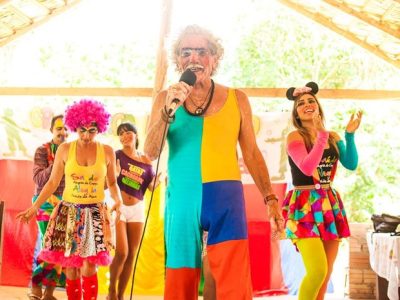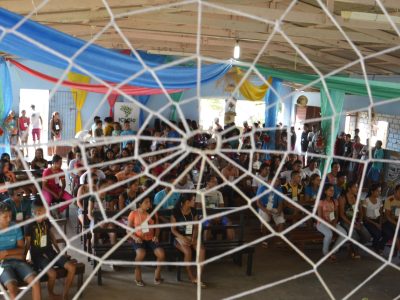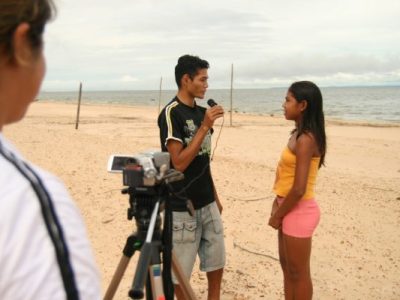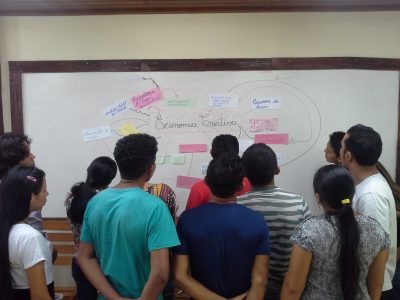Education, Culture and Communication
Lands of Learning
These activities seek to improve the quality of education in the communities and reduce the gap between formal education and the socio-cultural and environmental reality of the students, as well as enable significant and contextualized learning through training and dissemination of innovative pedagogic approaches for education in rural, riverside and forest areas.
The access to quality education is still a challenge in the Amazon region. While in other regions quality is an issue, in these communities the great challenge is still access itself. Only 10.63% of children up to age five attend pre-schools. Although elementary school is nearly universal, older children and adolescents have difficulty in accessing education. Beyond this, the curriculum and teaching methods and standards are not aligned with the reality and the culture of the communities, resulting in low school performance.
Facing this context, PSA works to incorporate the National Common Curricular Base (BNCC) in rural schools. It draws on the following: “to get to know and form their own personal, social and cultural identity, forming a positive image of themselves and their belonging groups in the different experiences of care, interaction, games and language experienced in the school institution and within their family and community context”. It is also aligned with the Operational Guidelines for Basic Education in Rural Schools (Resolution CNB/CEB n. 1/2002).
The project sees land as a space marked also by human relationships, meaning that the social and community surroundings are also lands of learning. Thus, local knowledge is respected and is valued as much as school curriculum in an associative and non-competitive way, addressing the concept of Meaningful Learning (characterized by the cognitive interaction between new and previous knowledge).
The actions are executed in collaboration with managers, teachers, students and families. Activities include training of teachers, efforts to make the curriculum more relevant, and campaigns to promote the rights of children and adolescents. Other activities include creation of regional teaching materials and geographic and cultural mapping of the areas where the schools are located, which form the content of educational activities.
LANDS OF LEARNING PILLARS
Community and Environmental Education
In the Amazon, environmental education and cultural identity are strategic and complementary. In these communities, traditional knowledge is what forms the meaning of life, and also informs how they manage their natural resources. Based on this knowledge, communities understand themselves and the importance of the Amazon to the entire world. Despite this, they are increasingly pressured by predatory models, and find themselves lacking the needed support to protect themselves and to promote sustainable lands.
The program’s work approaches community and environmental education as a matrix that includes many other subjects. Developed actions complement formal education at school, using PSA’s infrastructure. For example, the Abaré hospital-boat offers educational and recreational activities to the communities it assists, and the Active Forest Experimental Center (CEFA) trains teachers and provides extracurricular activities.
Forest Schools
The work is aimed at building educational models that are more appropriate for the Amazon communities, with experiences that show how to offer more contextualized education and teaching that makes more sense to the students and their communities.
This includes teacher training in rural education and/or environmental education, territoriality and learning methods. The students themselves, with the support of their teachers and PSA instructors, have mapped their own communities in order to create local memory and systematize community knowledge for educational ends.
These topics are further developed: what is the socio-environmental profile of my community? What knowledge does the community have that is not taught in school? How does the community knowledge affect school? The answers to these and other questions result in maps, drawn with the aid of cartography technologies, photos, videos and research, and include diverse aspects of community life: social, economic and environmental profile; traditional and popular knowledge (children’s games, myths and legends, history and cuisine); culture and art (music, poetry and handicrafts); geographic characteristics; biodiversity; and business activities.
Such information is then incorporated into regional teaching methodologies and materials that “add flavor” to schools so that learning is fun.
Active Forest Experimental Center – A school in the forest
In addition to working directly with schools, the project has developed an innovative rural educational hub, the Active Forest Experimental Center (CEFA)
CEFA develops:
- Advocacy for surrounding schools with new teaching approaches and practical environmental education. Students visit the teaching areas, composed of forest, streams and bio-architectural constructions, in an educational environment that raises awareness of environmental conservation through significant environmental experiences to form personal and collective values. It includes topics such as: Waste/Residue; Water; Soil; the Life Cycle; Forests and Biodiversity; Bio-construction; Good Nutrition; Agroecology; Renewable Energies; Traditional Knowledge – myth and legends of the forest.
- Technical courses for adolescents and youth offering professional training in traditional communities of the Amazon’s Conservation Units. The focus is income generation from regional potential, through projects for fomenting and incubation of socio-biodiverse productive chains. This curriculum is based on local socio-cultural context and includes: agroecology (syntropy, sustainable agricultural models); reforestation and forest seeds (seed collection and planting); oils and essences (extraction and processing of natural oils); meliponiculture of native bees; community-based tourism (itineraries, reception, cuisine, artisanal production); appropriate technologies and local services.
Child and Adolescent Rights
All actions within the scope of Lands of Learning aim at the full realization of the fundamental human rights of children and adolescents, established by the Federal Constitution of 1988 and in the Statute of Children and Adolescents (Law no. 8.069/1990).
In addition, the project develops specific campaigns to advocate, defend and spread the word about these fundamental rights. Schools and communities are mobilized and made aware of these rights and form local work groups, to support educational campaigns on priority topics identified in the communities. Topics include family and community coexistence, citizenship, health, gender, prevention of abuse and exploitation, among others. Content is then communicated through network and media, such as Mocoronga Network.
The work is also aligned with the Children’s and Adolescent Rights City Councils (CMDCA) of which PSA is advisor, and the Guardianship Councils, in order to work alongside the government in identification of denial of rights, abuse and exploitation and to contribute to the improvement of public policies in this area, adapted for the riverside community.
Mocorongo Circus
Cabocla Web
Mocoronga Communication Network
Youth Entrepreneurship
Rádio Mocoronga
Contact
- Av. Mendonça Furtado, 3979
- +55 93 3067-8000
- +55 93 99143-1091
- psa@saudeealegria.org.br
HOW TO HELP
Projeto Saúde & Alegria © 2020
Agência Fervo









